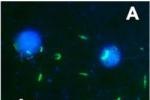Antagonistic and synergistic effects of protistan grazing and viral lysis on production and community composition bacterioplankton
Protistan bacterivory and lysis of bacterial cells by specific viruses, bacteriophages, are two most important factors responsible for shaping the dynamics and community composition of bacterioplankton in aquatic ecosystems. Because phages and flagellates consume or attack the same prey - bacterial cells, antagonistic interactions between these two mortality sources may be expected. However, our current research activities have brought surprising new findings. Selective grazing of protists on particular groups of bacteria induced significant shifts in the taxonomic composition of bacterioplankton towards the dominance of only a few phylotypes, either capable of very fast growth or of filament formation. Since phages do not typically trespass genus boundaries and since phage infection is density dependant, the grazing–induced bacterioplankton community shift could stimulate activity of the host-specific bacteriophages whose proper hosts overgrow in the system. Thus, instead of the assumed antagonism between these two mortality sources, their partial synergy through the stimulation of certain groups of bacteriophages has been found. Analysis of a series of in situ experiments conducted in the Římov reservoir revealed evidence that under certain circumstances protistan bacterivory and virus lysis indeed can act synergistically. The interplay of both mortality factors caused a rapid increase in the abundance of filament forming bacteria from the genus Flectobacillus, which were apparently both grazing- an d virus-resistant. In contrast, some bacterial groups vulnerable to virus infection were significantly suppressed that led to decreased competition for limiting substrates, which accelerating growth of the Flectobacillus filaments.
Šimek, K., Horňák, K., Jezbera, J., Mašín, M., Nedoma, J., Gasol, J. M. Schauer. M.: Influence of top-down and bottom-up manipulations on the R-BT065 subcluster of b-proteobacteria, an abundant group in bacterioplankton of a freshwater reservoir. Appl. Environ. Microbiol. 71: 2381-2390 (2005)
Jezbera, J., Horňák, K., Šimek, K.: Food selection by bacterivorous protists: insight from the analysis of the food vacuole content by means of Fluorescence In Situ Hybridization. FEMS Microbiol. Ecol. 52: 351-363 (2005)
Horňák, K., Mašín, M., Jezbera, J., Bettarel, Y., Nedoma, J., Sime-Ngando, T., Šimek, K.: Effects of decreased resource availability, protozoan grazing and viral impact on a structure of bacterioplankton assemblage in a canyon-shaped reservoir. FEMS Microb. Ecol. 52: 315-327. (2005)
Jezbera, J., Horňák, K., Šimek K.: Prey selectivity of bacterivorous protists in different size fractions of reservoir water amended with nutrients. Environ. Microbiol. 8: 1330-1339 (2006)
Šimek K., Hornák K., Jezbera J., Nedoma, J., Vrba, J., Straškrábová, V., Macek, M., Dolan, J. R., Hahn M.W.: Maximum growth rates and possible life strategies of different bacterioplankton groups in relation to phosphorus availability in a freshwater reservoir. Environ. Microbiol. 8: 1613–1624 (2006)
Horňák, K., Jezbera, J., Nedoma, J., Gasol, J.M., Šimek, K.: Bacterial leucine incorporation under different levels of resource availability and bacterivory in a freshwater reservoir. Aquat. Microb. Ecol. 45: 277-289 (2006)
Weinbauer, M.G., Horňák K., Jezbera J., Nedoma, J., Dolan, J.R., Šimek K.: Synergistic and antagonistic effects of viral lysis and protistan grazing on bacterial biomass, production and diversity. Environmental Microbiology, 9 (3): 777-788. (2007)
Šimek K., Weinbauer, M.G., Horňák, K., Jezbera J., Nedoma, J., Dolan J.R. Grazer and virus-induced mortality of bacterioplankton accelerates development of Flectobacillus populations in a freshwater community. Environmental Microbiology, 9 (3): 789-800. (2007)














